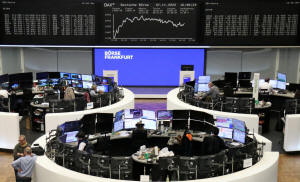European stocks mixed as China optimism fades, focus on U.S. mid-terms
 Send a link to a friend
Send a link to a friend
 [November 08, 2022] By
Elizabeth Howcroft [November 08, 2022] By
Elizabeth Howcroft
LONDON (Reuters) - European stocks
struggled to make gains on Tuesday and the dollar picked up as traders
pulled back on hopes that China could ease its zero-COVID policy and
showed signs of caution ahead of U.S. mid-term elections.
Markets had started the week with a "risk-on" tone, which some analysts
attributed to hopes that China could relax its strict COVID-19 lockdown
measures. Markets have also been buoyed by some investors expecting the
U.S. Federal Reserve to take a more dovish tone.
But the move showed signs of losing momentum on Tuesday as Asian stocks
saw only small gains. The yuan weakened against the dollar and Chinese
stocks slipped as COVID-19 cases rose.

European stocks indexes opened in the red, then became mixed. Wall
Street futures were down.
"I donít see the rationale for expecting a softer tone from Xi and the
rest of the Chinese party," said Tom Caddick, managing director at
Nedgroup Investments, referring to China's President Xi Jinping, noting
that Chinese officials have repeatedly affirmed the zero-COVID policy.
At 0945 GMT, the MSCI world equity index, which tracks shares in 47
countries, was up 0.2%.
Europe's STOXX 600 was up 0.2%, holding just below the previous
session's high, which was its highest in nearly two months.
London's FTSE 100 was down 0.2%, France's CAC 40 was down 0.2% but
Germany's DAX was up 0.3%.
Investors were focused on the U.S. mid-term elections, in which control
of the U.S. House of Representatives is at stake. Non-partisan
forecasters expect Republicans to win a majority in the chamber, which
would allow them to block President Joe Biden's legislative agenda.
Voting results may take days to become known.
A split government is generally seen by analysts as a more
market-positive outcome. Options market strategists said that a surprise
victory for Democrats could prompt a negative market reaction.
[to top of second column] |

The German share price index DAX graph
is pictured at the stock exchange in Frankfurt, Germany, November 7,
2022. REUTERS/Staff

Nedgroup Investments' Tom Caddick said that a divided Congress could
be seen as "broadly neutral to mildly positive" for stocks in the
sense that it would provide some visibility that there is unlikely
to be dramatic policy changes in future.
But, he said, "a truly market-positive outcome at this stage would
be a stronger read coming through for the Democrats because if we
get a Republican shift and you get this locked U.S. political
stalemate, there's very little opportunity for change and for the
incumbent to actually implement any of their policies."
RBC Capital Markets analysts said in a client note that "the market
has positioned itself for a modest positive risk tone if the
Republicans are able to take control of the house and an even larger
positive shock if Republicans take control of both chambers."
"The market is wanting to cling to any positive news and a market
positive Midterm result could mean another risk positive day," RBC
said.
The safe-haven U.S. dollar was up 0.1% against a basket of
currencies, while the euro was down 0.2% at $0.9996.
Euro zone government bond yields were a touch higher, with the
benchmark 10-year German yield at 2.342%, as traders waited for key
inflation data later in the week and hopes for a quick end to the
central bank's cycle of rate increases faded.
The European Central Bank will continue to raise borrowing costs
even as the euro zone economy suffers because letting inflation stay
high would be even more painful, two top ECB policymakers said on
Tuesday.

In Britain, grocery price inflation hit 14.7% in October, data from
market researcher Kantar said. The British pound was down 0.4%
against the dollar, at $1.1478.
Oil prices fell on fears of lower demand from China.
(Reporting by Elizabeth Howcroft; Editing by Robert Birsel)
[© 2022 Thomson Reuters. All rights
reserved.]
This material may not be published,
broadcast, rewritten or redistributed.
Thompson Reuters is solely responsible for this content. |